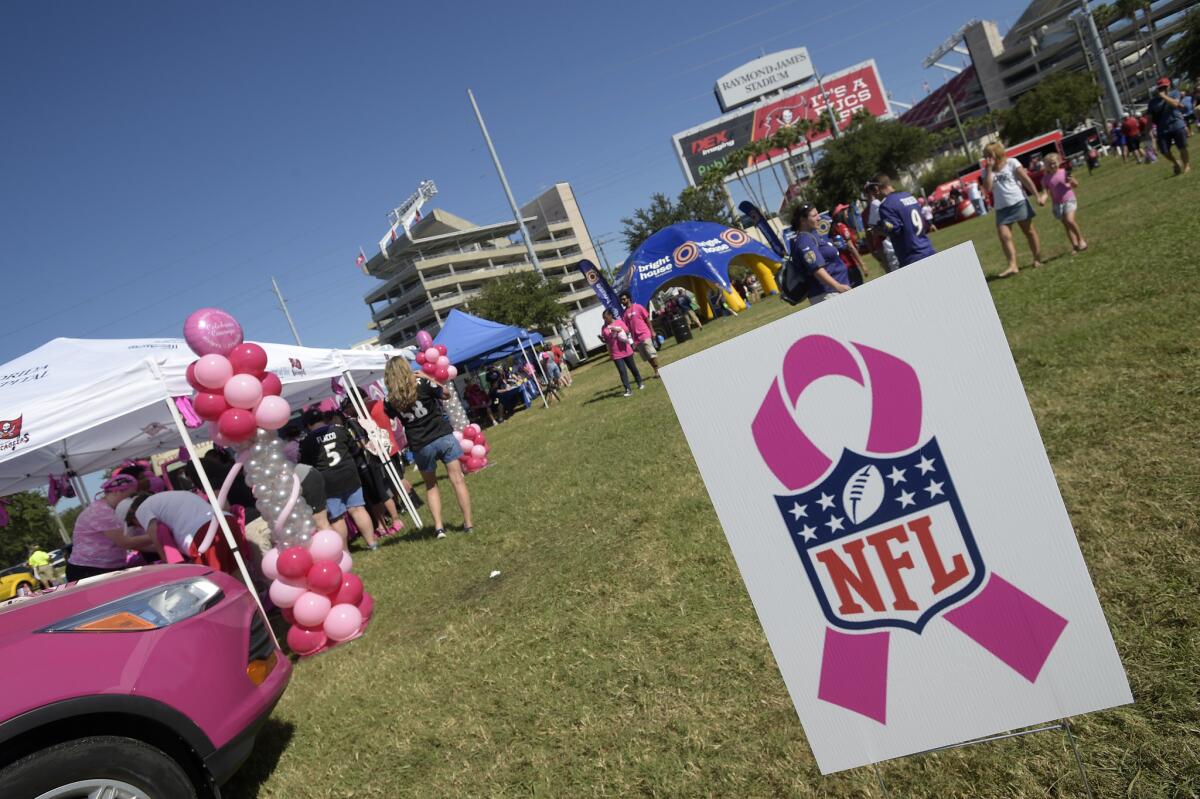Op-Ed: Why women need more science with their breast cancer survival stories

October was National Breast Cancer Awareness Month. Football players took to the field in splashes of pink, and women’s magazines featured celebrity survivors such as Suzanne Somers and Sheryl Crow, smiling alongside headlines attributing breast cancer survival to an upbeat attitude, personal fortitude and a conscientious shift toward a more healthful lifestyle.
You have to applaud the willingness of these survivors to raise awareness of the disease. As a 20-year survivor myself, I recognize that such stories can be empowering. But given current scientific research on the disease, I also know that dispensing knowledge about breast cancer based on individual, anecdotal stories alone isn’t nearly enough.
Too many women (and men) face a diagnosis armed initially with the familiar, predominantly optimistic and simplistic narrative of early detection-treatment-recovery. Many will face much more complicated challenges, choices and outcomes and may, as a result, feel they have somehow failed in their response to the disease. Rather, the problem lies with the narrowness of many published narratives.
The real story of breast cancer in 2014 is all about nuances, the search to unlock the complexities of cancer etiologies, and develop treatments that will target specific cancer sub-types. In labs around the globe, scientists are investigating an array of novel approaches to outwitting each type: immunotherapy isn’t the same as the targeting of biomarkers or manipulation of tumor microenvironments.
“Triple-negative” disease is a different beast than tumors that test positive for estrogen, progesterone or Her-2, a protein that indicates a particularly aggressive form of the disease. The treatment course for inflammatory breast cancer isn’t the same as for ductal carcinoma in situ. “Previvors,” women such as Angelina Jolie who have tested positive for the BRCA1 or BRCA2 gene and taken steps to dramatically reduce their risk of developing the disease, tackle different issues than those with metastatic breast cancer, whose disease has spread beyond the primary site.
It’s worth noting that even at the dawn of “breast cancer awareness,” the more complete the story, the bigger the impact. First, credit is due a generation of women brave enough to end the secrecy that surrounded a breast cancer diagnosis and tell their tales — Betty Ford, Happy Rockefeller, Betty Rollin and Shirley Temple Black broke the silence in the 1970s. One groundbreaking survivor went much further. Rose Kushner, a journalist, shared with the public not only her experiences, but also the underlying science and the medical thinking about breast cancer in a book published in 1975.
“It was Saturday night, June 15, 1974,” Kushner began, “when I found the tiny bulge on the edge of my left nipple.”
She combined her own story and the basics of cell biology, telling women in everyday language what medical experts knew about the causes of breast cancer and the details of the psychological aftermath of treatment. Her research and personal experiences led her to argue against the conventional surgical procedure that followed a biopsy of suspicious breast lumps with mastectomy (if the biopsy showed cancer cells), all in a single operation. Instead, Kushner insisted that women should have the option of a two-stage procedure, allowing them the time to reflect, research and consider their alternatives before making treatment decisions. Her ideas were first rejected, as her obituary in the New York Times stated, and then became standard practice.
Kushner’s message inspired not just individual patients but a collective advocacy movement of women who demanded more knowledge, more choices and more control. It’s an irony of the successes of that advocacy that the more we’ve learned about the disease, the less the public stories about breast cancer accurately reflect current thinking among experts.
The fact is, one cover girl’s breast cancer story won’t necessarily reflect another’s experience. Cancers clustered under the umbrella term “breast cancer” are unique in their characteristics, patterns of growth and the interventions to which they respond.
Popular media — and survivors — need to offer accessible, clear information on the state of the science alongside testimonies. All the complexities of breast cancer can’t be sufficiently covered in the pages of every women’s magazine, but they should at least offer more than one “plot.”
It’s tempting to find comfort in a tidy narrative of survival that features someone we admire. But anecdotes and October headlines barely begin to empower people with the knowledge they’ll need should they be diagnosed with a form of the disease. Adding more than a minimal dose of science to these stories would make them richer and more vital to the mission to spread real awareness about breast cancer in all its forms.
Cynthia Ryan teaches writing at the University of Alabama at Birmingham. She is completing a personal and investigative report about breast cancer.
Follow the Opinion section on Twitter @latimesopinion
More to Read
Sign up for Essential California
The most important California stories and recommendations in your inbox every morning.
You may occasionally receive promotional content from the Los Angeles Times.










